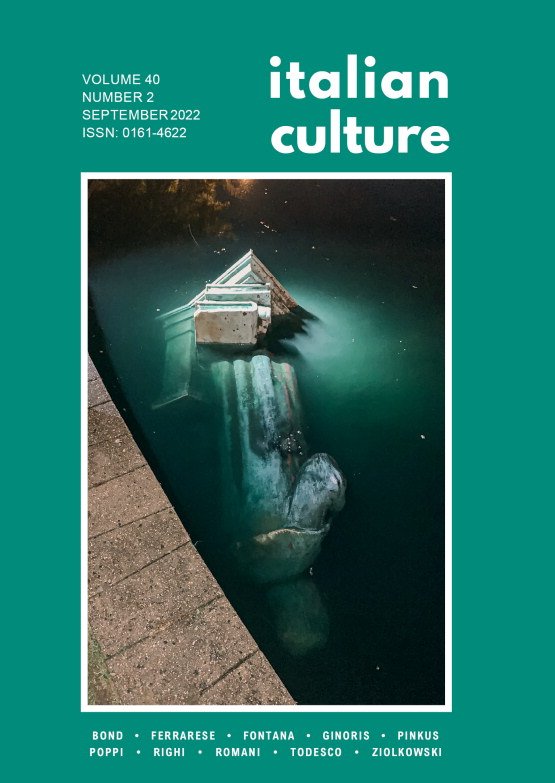Roots, Migration, and “Ius Sanguinis” Culture
My recent article “Cesare Pavese, Homo Mediterraneus?” published in Italian Culture vol. 41 (2023) reads the work of Cesare Pavese in light of the critical challenges of transnational Italian studies and analyzes Pavese’s aesthetics of rootedness, representations of migration, and practices of translation as sites of tension between local and global geographic scales. Accepting Carlo Bernari’s provocative suggestion that we consider Pavese a “Southern” writer, the article traces how Pavese portrays the land, sea, and ocean within a geophilosophical “sistema di rapporti” (Furio Jesi) reminiscent of a Heideggerian “fourfold.” In Pavese, an “anti-oceanic” attitude goes hand in hand with his treatment of land and sea as two opposite mythical realms, which we see expressed in his translation of Herman Melville’s “oceanic” novel Moby-Dick. Similarly, Pavese’s dystopian accounts of emigration can be seen as anti-oceanic narratives that articulate the need to return. With his telluric symbolism and his notion of an indissoluble attachment to the land, Pavese’s aesthetics participates in the culture of ius sanguinis that, over seventy years after Pavese’s death, is still a remarkable feature of Italian society, as we see in contemporary debates on the 1992 Italian citizenship law.
Link to full article here.
Passeurs: Narratives of Border Crossing in the Western Alps
In the project “Passeurs: Narratives of Border Crossing in the Western Alps,” I analyze documentaries, novels, and essays offering compelling portraits of the professional guides for migrants illegally crossing the French-Italian and Swiss-Italian borders, from World War Two to the present. I argue that these texts complicate and help question the current criminalization of migrant smugglers most often found in the media and political discourses. In particular, I claim that these discourses confuse or dismiss migrants’ experience of border crossing, as they neglect important ethical and legal differences between smuggling and trafficking, humanitarian actors and professional smugglers. The texts I analyze insist on these nuances, enriching our understanding of the human stakes of “illegal” migrations.
Since 2018, I was invited to present this research at different venues including the UCLA Center for European and Russian Studies and Pepperdine University in Malibu.
For an excerpt of my presentation at Pepperdine University in April 2019, click here.
For the full text of the peer-reviewed article published in California Italian Studies, vol. 9 click here.
Film Dubbing and Collaborative Pedagogy
The article “Film Dubbing and Collaborative Pedagogy” is the result of a co-teaching experience with Dr. Viola Ardeni and our experimental use of dubbing and Project Based Learning in the Italian language classroom. In this article, we discuss the multi-layered collaboration occurring among students, between students and teachers, and among instructors in the context of an advanced Italian course at the college level. We specifically showcase the project-based learning activity Ma chi parla? (Who Is Talking?), during which students generated the audiovisual translation from English to Italian of film and television show excerpts. We argue that, in its implementation in fall 2018 at our institution, Ma chi parla? fostered creativity, engagement, and pluralism thanks to its collaborative structure, in addition to establishing a decentralised co-laboratory of cultural experiences. The article also frames Ma chi parla? as a starting point to reflect on audiovisual translation, in particular dubbing, as a long-standing tradition in Italy, to illuminate its history, to question its cultural effects, and to problematise its pedagogical applications.
Link to the peer-reviewed article in The Italianist 41, 2021 issue 2 here.
La Disparition by Georges Perec: Writing/Translating Wordplays
My work on La Disparition by Georges Perec results from my graduate research at the University of Bologna and in the Georges Perec Archive at the Bibliothèque de l’Arsenal in Paris. Studying La Disparition and its translations in Italian and English, I focus on the translation of wordplays within the novel and stress the creative potential of the lipogram—a text that intentionally excludes the use of a letter, in this case the vowel “e.” In La Disparition, the differences between writing and translating are blurred, to the point that one activity almost amounts to the other. The entire novel can be seen as a “translation” of many existing or imaginary texts into the lipogrammatic language. Similarly, translating wordplays from the original text into new languages means re-enacting the original writing exercise, in a potentially endless exploration of its linguistic creativity. Making references to theories of wordplay translation including Umberto Eco’s, I argue that different translation strategies correspond to different approaches to the “negotiation” of meaning that wordplay translation entails. I support my thesis by analyzing key examples from complete or incomplete translations of La Disparition in Italian (by Piero Falchetta, Gianni Celati, and Bruno Chiaranti), and three English versions (by John Lee, Gilbert Adair, Dirk Delabastita). I presented my work at the international conference Wordplay and Metalinguistic Reflection – New Interdisciplinary Perspectives in 2013 (Tübingen, Germany), and published my contribution as a peer-reviewed chapter in the volume Enjeux du jeu de mots edited by Angelika Zirker and Esme Winter-Froemel [full text here]. A shorter article on La Disparition was also published in Italian in Vol. 24 of the journal Parol: Quaderni d’Arte ed Epistemologia, 2013 [full text here].
Book Reviews
“Tedesco, Francescomaria. Mediterraneismo: il pensiero antimeridiano,” Comitatus: A Journal of Medieval and Renaissance Studies, Vol. 49, September 2018. Web, 277-281. [full text here]
“Tullio Pagano. The Making and Unmaking of Mediterranean Landscape in Italian Literature: The Case of Liguria,” Journal of Historical Geography, May 2016, Web, 108-109. [full text here]



